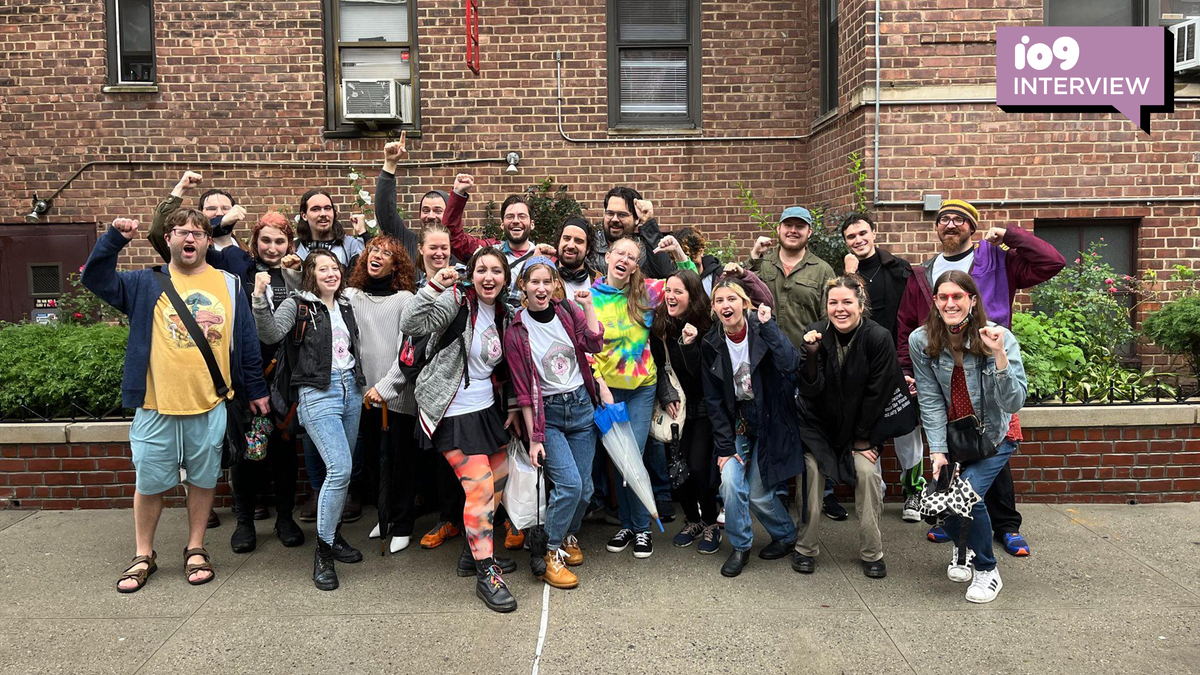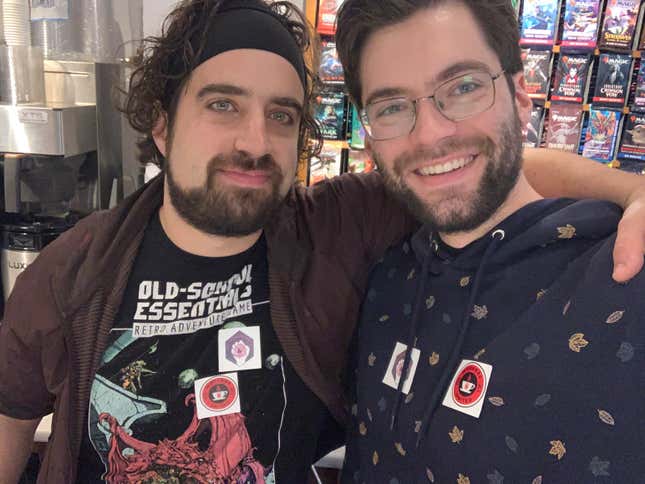
On Wednesday, the organized workers of board game bar/cafe Hex & Co. delivered a letter to one of the owners, Dr. Jon Freeman, asserting their right to collectively bargain, and asking him—and co-owner Greg May—to voluntarily recognize the union.
Hex & Co. has three locations across New York City. It offers board game rentals, limited food service, and after-school programs for kids. This latest organizational effort, made alongside United Workers, is just the latest example of niche industries and small workplaces asserting their worth. If Hex & Co. unionizes, it would be the first board game cafe to do so in NYC. io9 spoke to members of the unit and former employees to get a look at what’s going on at this beloved gaming hotspot.
The entire Hex & Co. workforce is made up of around 100 workers. Over 75% of the entire workforce signed a petition supporting the formation of the Hex & Co. unit, which would comprise 75 members. The group approached Freeman and May earlier in the year with a signed petition and an ask to bargain collectively without unionizing, but the owners turned down the offer, questioning whether or not people knew what they were signing or were completely aware of the situation. The employees assured the owners that they had explained collective action to the workforce, but Freeman and May still declined. Now, the unit is back, and they’ve got paperwork. “You do things one on one,” said an employee who was involved in the organization process, referring to management. “We do things collectively.” They continued: “They underestimated us, and now they have a lot more to deal with.”
There were three initial asks when the group approached management: a New York City living wage, a clear path to promotion, and more staff to respond to the workload. Multiple sources detailed that “very few” of the folks working at the shops were making living wages. While DMing or working with the kids in the afterschool program, employees make anywhere from $16-18 an hour, and occasionally $19 an hour. While working as baristas, they make $12.50 an hour, plus tips. Employees are frequently asked to perform multiple roles—DM, barback, babysitter, tutor, and janitor, all rolled up into one—in order to keep Hex & Co running smoothly.
“People sometimes think because you work with games that your work must be easy and fun all the time,” said Joe DeSimone, a franchise producer at game publisher Asmodee who frequents Hex & Co. as a customer. “They forget it’s still a job. In the case of the workers at Hex, it’s a service job. That’s brutal work. I’m glad to see them advocating for themselves and demanding better.”
Jace Alejo, one of the managers at Hex & Co. said, “It’s unrealistic [for management] to expect that we’re able to pay off all of our bills and to live in this city on the wages that we’re getting.” One of the employees who asked to remain anonymous said that the tipping point for them was when they worked a full week and were only paid $200. “I had to call my parents and I had to ask for money. I said, ‘I can’t make rent this month because apparently I didn’t serve enough chicken nuggets’.”
Mikayla Wilson has been at Hex & Co. for three years. She is a professional DM who has only been given one promotion after two and a half years; it came with a dollar pay increase and “triple the work.” Wilson said that the $19 an hour she makes still isn’t enough. “If I miss one shift, I’m not getting groceries that week.” Independent, professional DMs can typically charge $20 to $50 per person—typically, that would mean five total—per gaming session, which usually runs for three hours, amounting to anywhere from $20 per hour to $80 per hour.
Hex & Co.’s after-school programs are akin to childcare or tutoring, especially since Hex & Co. has a curriculum that counselors are asked to memorize. Wilson also said that they only get “30 minutes of paid prep time,” and if the employee is a DM for the afterschool program, that prep time is frequently eaten up by the need to pick children up from school and bring them to the shop for the afterschool program. “Managers try not to ask the DMs to do pickups, but there are days where we have no other choice.” Wilson said that because of this uncertainty, “most of the DMs I know, including myself, prep outside of paid time. And that’s just because you need to do it in order to do your basic job functions.”
The promotional path is murky, in part because nobody at Hex & Co has set job descriptions. Additionally, because of the business setup of the company, each site is made up of two LLCs—one for the cafe and one for the social space—and employees often work at multiple locations, and perform multiple jobs, such as professional DM and barista. Which means that at tax season, employees can have anywhere from two to six W-2s to file for working at a single company.
Promotions are given out rarely and accompanied by one-dollar raises. Sasha Brunetti, one of the after-school counselors, has yet to receive a raise after a year at the company, and says that the system is “arbitrary” and is essentially a rote memorization quiz. The quiz for a raise involves being asked to “teach” a board game to the managers and sometimes one of the owners. But, Brunetti said, “if you’re not teaching board games—say, you’re teaching card games—then you have really no way of getting that raise unless you’ve memorized board games that you aren’t actually teaching.” Employees are also asked to explain the brain functions each game encourages, based on Freeman’s observational research and his background in neuroscience.
Much is made of the community that has been fostered at Hex & Co.; it’s apparent in its marketing materials for the newest Kickstarter, it’s on the company’s site, and it was emphasized by every single person I spoke with. But the community here was created by the “all-star staff”—not the management. As Wilson explained, “They see us as this community that they are a part of. But, at least to me, in my opinion, as someone who’s a part of this community, they sure don’t seem to care about us surviving.”
One employee said that management frequently says that they are “here to address concerns.” Management says “they want to make sure that our community remains like a safe and happy place for everyone.” But, “if that were true, they’d be paying us more,” they explained. “You can’t look at me, someone who has to pay rent and go to the doctor sometimes, and say ‘you’re a full human being’ and pay me close to minimum wage in New York City.”
Brian Flaherty, an award-winning actual play podcaster, hopes the workers will succeed. “As an Upper West Sider, Hex & Co. is my Friendly Local Game Store… Hex & Co. is a place that means a lot to me, but a business that doesn’t provide its employees with the dignity of a living wage doesn’t deserve the superlative of ‘Friendly.’ If Hex & Co. doesn’t recognize Hex Workers United then they’re just another place to buy games,” he told io9. “If they’re not making my community better then I might as well just order from Amazon… Until Hex & Co. voluntarily recognizes Hex Workers United and agrees to their very reasonable demands, I won’t be going back.”
One of the problems that many of the employees iterated was that they feel like Freeman and Gray think “very little” of them. The impression among employees is that because this isn’t a traditional career, they are often treated as if they are “replaceable and unskilled.” But these workers, many of whom have passion projects and side hustles in the gaming industry, are professionals who are exceptionally good at their jobs.
Every single employee io9 spoke to for this article praised the people they work with. “I am constantly reminded how talented and wonderful our staff is,” Wilson explained. Many of the staff are game designers, published writers, and novelists. A former employee says that the workers at Hex & Co. provide an essential community in a city that is often isolating.

Brunetti described just how impactful this space is for the kids who come to the program. “I’ve had a couple kids refer to me and other counselors as their safe space. They come to us for support when they need it. Some parents have told me that this is the highlight of their child’s week.” A former employee said that they frequently had parents come up to them and detail “the explicit and obvious changes in their kids behavior and approach to interacting with other people” after playing games at Hex & Co.
Alejo said that this is “the most enjoyable job I’ve ever had,” and emphasized that they “love my coworkers. I love interacting with them. They’re some of my best friends right now.” Alejo even says that they are genuine friends with some of their regular customers because the community that the staff has created is so warm and welcoming.
When asked why this job was worth fighting for, one employee was particularly eloquent. “The community. The people that I work with are bright and they’re vibrant and they’re friendly… [This job] is rewarding in a lot of ways, especially the after-school program. Working with children is something that I personally find very rewarding. And it’s really about the community that has been built here.”
They continued, “ownership likes to say that they built the community and that they’re responsible for it, but they’re never in the store. The workers built that community. It’s truly one of the last places that I exist in New York City where I can say these are people who I not only feel a connection with because we have something in common, but I feel a connection with because we’re together here… We met in person and this place was wonderful enough to keep us here and bring us together.”
Dillin Apelyan (aka superdillin), a game designer and actual play performer, said to io9 via DM, “Hex & Co. staff have always welcomed me, celebrated my games, and shared their joy and love of gaming with me whenever I spend an evening at any location. The reason Hex & Co. is such a wonderful environment is because of the staff most of all and they deserve to live and live well, full stop. I am rooting for them and will be celebrating this win with them.”
And the exceptionally welcoming and knowledgeable staff cannot afford to live in New York City on the extremely low wages at Hex & Co. While the Hex & Co. unit members would prefer to be voluntarily recognized, they are highly organized and have been making plans to attempt collective bargaining for months. When asked if they were looking at a long fight, one employee, who was involved in the organization effort, and who fears retribution if named, said that they are taking this very, very seriously. They deserve a living wage. They deserve a good workplace. They deserve clarity and transparency. And if Freeman and May refuse voluntary recognition, the union is ready. “We are prepared to escalate,” they said.
io9 reached out to Hex & Co. management for a comment. We will update this article if they return our request.
Want more io9 news? Check out when to expect the latest Marvel, Star Wars, and Star Trek releases, what’s next for the DC Universe on film and TV, and everything you need to know about the future of Doctor Who.






